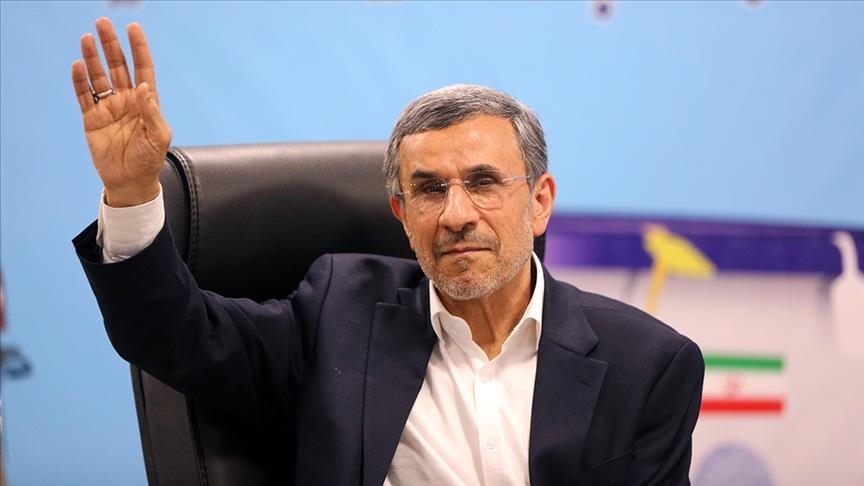TEHRAN, Iran
Despite being barred from running in 2017 and 2021, former President Mahmoud Ahmadinejad has once again thrown his hat into the ring in presidential election slated for June 28.
Considered a strong contender if his candidacy is approved, Ahmadinejad, who served as head of state from 2005 to 2013, was a controversial figure both in Iran and globally.
He announced his candidacy at a press conference following the registration process, citing widespread public demand as the driving force behind his decision to seek the presidency again.
Throughout his term, Ahmadinejad, known for his modest lifestyle, implemented supportive policies for the low-income and impoverished segments of the country.
During this period, he gained the support of the Iranian people, who were facing economic problems, with slogans like “justice, compassion, fairness and integrity” and provided direct cash aid and subsidies in some areas.
In terms of foreign policy, Ahmadinejad pursued “hawkish” policies throughout his tenure, particularly displaying an uncompromising stance against Western countries in matters concerning Iran’s nuclear and defense fields.
Ahmadinejad was also accused by the US and some European countries of disregard for human rights.
Protests erupt following reelection in 2009
Ahmadinejad won the June 12, 2009 presidential election with 64% of the vote against his rival, former Prime Minister Mir-Hossein Mousavi, amid claims of electoral fraud.
Supporters of Mousavi protested the results with slogans like “Where is my vote?” which led to demonstrations on election night.
Mousavi appealed the results to the Guardian Council, which oversees elections and legislation, and Iran’s Supreme Leader Ayatollah Ali Khamenei ordered an investigation into allegations of fraud and irregularities in response to demands from leaders of the Green Movement, a civil rights-type movement that challenged the status quo of the socio-political structures of the Islamic Republic.
Ahmadinejad claimed the election results reflected the free will of the people and hailed them as a “great victory” for Iran.
The protests, which lasted for about a week, resulted in at least 32 deaths according to official figures, with thousands of people being arrested. During this period, Khamenei expressed support for Ahmadinejad.
Divergence with Supreme Leader
However, Ahmadinejad drew criticism from Khamenei after he fired Intelligence Minister Gholam Hossein Mohseni Ejeie. Subsequent disagreements arose between the two, particularly when Khamenei refused to endorse Ahmadinejad’s appointments.
After his presidency ended in 2013, Ahmadinejad’s allies were purged and investigations and arrests were made against those close to him.
Despite being criticized for restricting freedoms during his tenure, Ahmadinejad attracted attention for advocating freedoms after leaving office.
His attempt to run for president in the May 2017 elections against incumbent President Hassan Rouhani was thwarted when Khamenei did not grant him permission to do so, further deepening the rift between the two.
Targeting close associates and criticizing Larijani brothers
During this period, Ahmadinejad began to criticize Khamenei and the Larijani brothers — then-Chief Justice Sadegh Larijani and his brother Ali Larijani, the speaker of Parliament.
He particularly targeted the Larijani brothers, accusing Sadegh of being involved in judicial corruption for 10 years.
In April 2018, 43 high-ranking officials, including former ministers from Ahmadinejad’s administration, issued a statement criticizing him for destabilizing the country, urging him to “return to the principles of the revolution.”
The attitude towards Ahmadinejad began to soften after Sadegh Larijani was removed from his position as chief justice in 2019 and Ebrahim Raisi, who was widely seen as a protégé and confidant of Khamenei, was appointed in his place.
However, Ahmadinejad’s request to run in the 2021 presidential election against Raisi was vetoed by the Council of Guardians, and Raisi went on to win the polls.
Raisi was killed in a helicopter crash on May 19 this year along with Foreign Minister Hossein Amir-Abdollahian and several other officials, raising the need for election to be held.
Ahmadinejad currently serves as a member of the Expediency Discernment Council, a constitutional body that resolves disputes between Parliament and the Guardian Council.
Aware of the need to obtain the Guardian Council’s approval for his candidacy for the upcoming presidential election, Ahmadinejad has refrained from directly criticizing the government in recent years.

